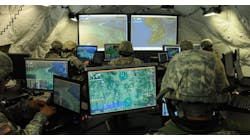Airframe builder Spirit AeroSystems and Airbus SE announced their long-expected agreement to transfer ownership of certain operations to Airbus, easing the way for Spirit to be acquired by Boeing in a multi-billion-dollar consolidation expected later this year.
Airbus reportedly will collect a $439 million payment from Spirit.
Boeing and Spirit AeroSystems have been drawn together by need for the larger business to gain control of the supply chain for its two most important commercial aircraft – the 737 MAX and 787 Dreamliner. In addition to supplying those programs, Spirit AeroSystems manufactures critical structures for various other commercial, military, and private aircraft programs. Included among these are the Airbus A220, A320, and A350, making it necessary to separate those assets before Boeing can complete its takeover plan.
Airbus will take over the Spirit AeroSystems plants in Kinston, N.C., and St. Nazaire, France, which produce A350 fuselage sections; an operation in Wichita, Kan., producing A220 pylons; a plant in Morocco where A321 and A220 components are produced; another plant in Scotland producing parts for A320 and A350 wings; and a plant in Northern Ireland where A220 wings and mid-fuselage sections are manufactured.
Another operation in Malaysia may yet be added to the Airbus portfolio if another buyer is not found.
Another contingency involves Airbus agreeing to provide Spirit with $200 million of non-interest-bearing lines of credit, for Spirit’s ongoing support of Airbus programs.
Spirit AeroSystems was formed when Boeing spun off the aerostructure fabricating operations in 2005. It later grew by adding assets from Bombardier Inc., Fiber Materials Inc., and Short Brothers plc, creating a widespread organization with a complex role in the global aerospace supply chain.
In recent years Spirit AeroSystems has been beset by labor problems and frequently short of capital resources, compromising its reliability and product quality, but also making it more dependent on Boeing and Airbus for its financial stability. This also made Spirit’s turnaround and recovery essential to the future success of its major customers.






